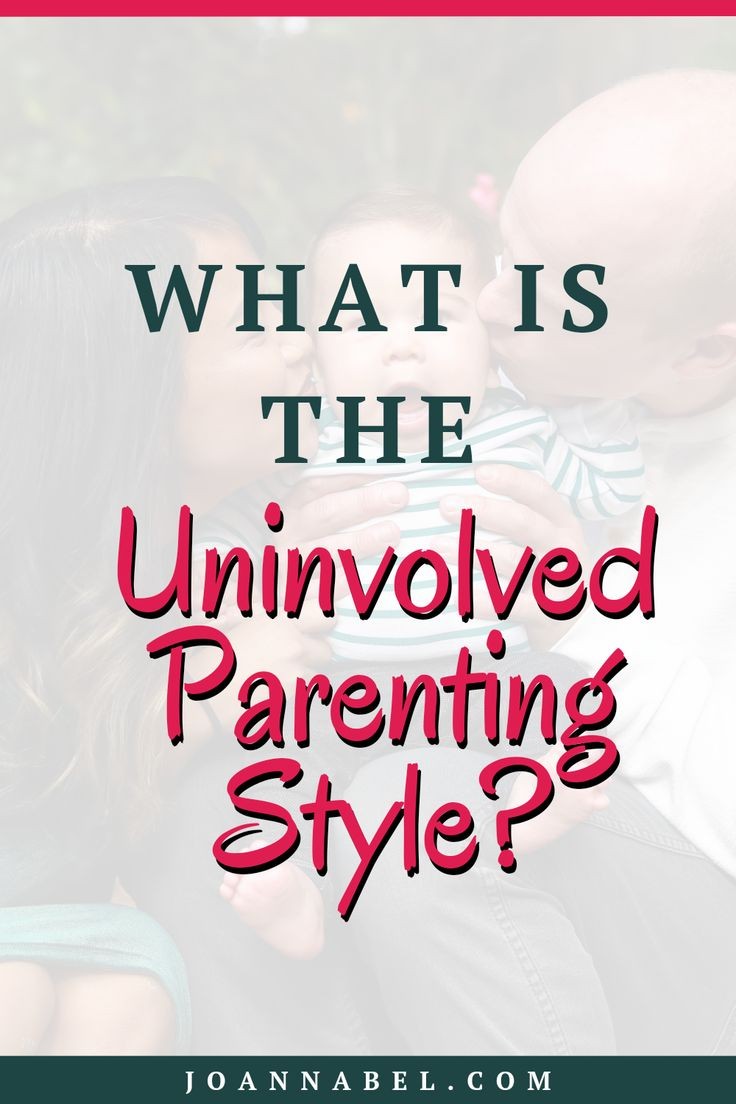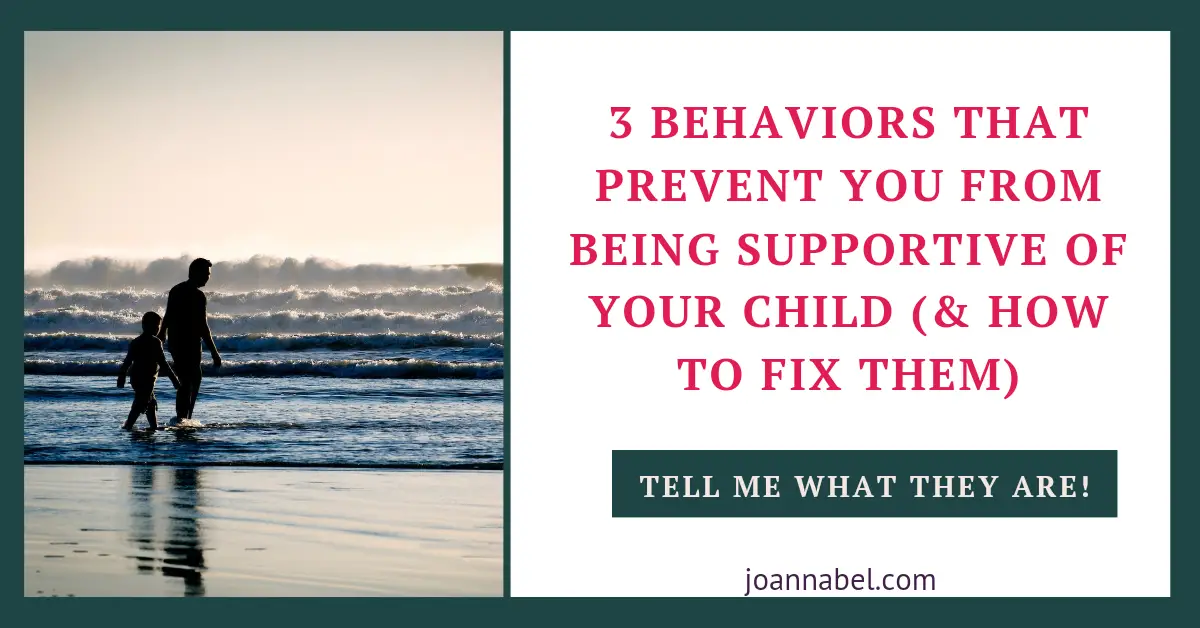Are you curious about Uninvolved Parenting Style? If you are and you want to know more about who is an uninvolved parent, then this is the post for you. Uninvolved parenting style is a parenting style characterized by low levels of connection and engagement of the relationships in the family because parents aren’t emotionally warm and responsive enough and (too) high levels of flexibility because parents disregard to provide suitable guidance children need. Uninvolved parenting style widely known as a Neglectful parenting style.

What Uninvolved Parenting Is (Neglectful Parenting)
So what we’ll address in this post is:
- how was uninvolved parenting discovered
- what uninvolved parenting is and how it looks like
- who an uninvolved parent is
- uninvolved parenting discipline
- uninvolved parenting effects
- the difference between uninvolved parenting and permissive parenting
And more. Let’s start.
Note: Although I am a Clinical Social Worker, engaging with this website does not establish a professional social worker-client relationship. The information provided here is for general purposes only and should not be considered professional advice. While we strive to ensure accuracy and reliability, this content is not a substitute for professional guidance. For specific concerns, issues, or situations, it is essential to consult a qualified professional and present your situation. Read the full Disclaimer here.
WHAT IS AN UNINVOLVED PARENTING STYLE?

The Uninvolved Parenting Style, widely known as neglecting or neglectful parenting style, is characterized with high levels of chaos – too little structure, too flexible, low demands, inconsistent rules and expectations and discipline – and low levels of engagement – disengaged relationships, too little closeness, lack of emotional warmth and responsiveness from parents.
Before we dig a little deeper into this parenting style, I need to mention what parenting style is, in case you’re not quite sure. As well as and how we found out that they exist.
If you are familiar with the term, skip right ahead to details about the uninvolved parenting style.
WHAT DOES A PARENTING STYLE MEAN?
Parenting style refers to the consistent and stable patterns of demands, structure, and responsiveness that parents cultivate in all of their interpersonal interactions with their children. And the parents’ practices are dependent on these patterns.
That’s why it’s called style – it is perpetual and it’s resistant to events, situations, a child’s age, and developmental phase.
This doesn’t mean that it’s unchangeable, it only means that it is constant.
For more information on the 5 parenting styles, check out my post that explores them in great detail: What The 5 Parenting Styles Are: All You Wanted To Know.
You may want to read also:
WHO DISCOVERED PARENTING STYLES?
Diana Baumrind, a developmental psychologist with a Ph.D. in psychology discovered parenting styles in her longitudinal study of families with preschoolers.
Her longitudinal groundbreaking research began in the early 70s where she followed the families to preschoolers’ late adolescence.
It consisted if home observations, laboratory observations, and interviewing the parents. And was one of the first that included both mothers and fathers.
The outcome of her groundbreaking study was a discovery of 2 main domains of behavior in parents – responsiveness and structured expectations, which in combination shed light on the 3 main initial parenting styles associated with 3 patterns of child behavior. They were:
- Authoritarian,
- Authoritative (democratic), and
- Permissive (laissez-faire) parenting style.
The 3 patterns of child behavior were:
1 – Assertive, self-reliant, self-controlled, cheerful-optimistic, and affiliative. (Associated with authoritative parenting style)
2 – Discontented, withdrawn, and distrustful. (Associated with authoritarian parenting style)
3 – Little self-control or self-reliance, and retreat from innovations. (Associated with permissive parenting style)
Baumrind’s typology came to include 7 parenting styles eventually (2013), because this exceptional scientist continued to work even though she was in her 80-s!
You may be interested to check out also:
- Authoritarian VS Authoritative Parenting Style
- Authoritarian vs. authoritarive vs. permissive parenting style.
UNINVOLVED PARENTING STYLE RESEARCH
Diana Baumrind conducted 3 studies of families with preschoolers and her 3rd study of preschoolers uncovered the rejecting-neglecting style.
This style is pretty similar to the style Maccoby and Martin later explained as the 4th parenting style, in addition to initial 3.
They explained that this style is low on both responsiveness and structure.
And Maccoby and Martin called it the uninvolved parenting style.
In this post I’ll actually describe how David Olson’s Circumplex Model of Marital and Family System inspects parenting styles and how it defines the uninvolved parenting. Because it’s one of the most widely used models for describing and inspecting the patterns of family functioning.
This model is based on system focus and the integration of 3 dimensions that are shown as highly relevant in a range of family theory models and family therapy approaches:
- family cohension,
- family flexibility, and
- communication.
More about these 3 dimensions and David Olson’s model read in my blog post about the 5 parenting styles. Here is the link to it.
And in Social and Behavioral Sciences today, the most relevant contemporary theories examining the relationship dynamics of family members are theories that utilize the system approach.
These theories and methodology are used to assess the family system and observe the functioning of the system as a whole, assess its interpersonal relationship, its interactions, and the system functioning of the family as a group.
This means that we can’t understand the family functioning without understand the relationships in any of the subsystems (like marriage). But also relations between the family and their social environment.
So all parts of the family system interact with one another continuously.
David Olson’s Circumplex Model of Marital and Family System is specifically constructed for outcome efficiency of marital and family therapy, clinical assessment, and planning of treatment (Olson, 1996).
More about rejecting parenting style you can read in my post that covers it: What is the Rejecting Parenting Style and are You a Rejecting parent?.
WHAT IS AN UNINVOLVED PARENTING STYLE ACCORDING TO OLSON’S MODEL?
The Uninvolved Parenting Style in the David Olson’s Model is determined as a style with high levels of flexibility (chaos) in the domain of flexibility of the family system and disengagement in the domain of family cohension (togetherness).
This model was able to scheme the descriptions of Baumrind’s parenting styles which emphasized responsiveness (support) and control with 4 parenting styles, but there was one quadrant in the model with no parenting style assigned.
So conceptually the Circumplex model added the uninvolved style. The style extremely high in flexibility – chaotic and extremely low in cohesion – disengaged.
For you to understand what are positive values in this model, you must understand the main hypothesis of the model.
The main hypothesis of the Circumplex Model is:
- Balanced levels of cohesion and flexibility are optimal for healthy family functioning, and for the family to be in balance, these level have to be between low and high levels (but not low or high).
- Unbalanced levels of cohesion and flexibility are associated with problematic family functioning because they have very low or very high levels of cohesion and/or flexibility.
Also balanced systems tend to have very good communication, while unbalanced systems tend to have poor one.
The model measures and presents how well the family handles separation vs. togetherness in each of the styles. And it’s proven especially useful for relational diagnosis.
In 2016 parenting styles were assessed on a sample of 667 mother-father couples using Olson’s model and 5 parenting styles were detected.
And the uninvolved style fitted the previous description and it turned out to be very low on closeness (disengaged) and very high on flexibility (chaotic).
(You can see the full presentation of the findings here in this article. You’ll find detailed descriptions of the differences in the characteristics of couples that participated in the research if you’re interested in specifics.)
AN UNINVOLVED PARENT’S BEHAVIOR (NEGLECTFUL PARENTING CHARACTERISTICS)
An uninvolved parent has a pattern of ignoring the child, and unless the child’s preferences collide with the parent’s activities, their preferences will prevail.
This suggest that children’s emotional needs won’t be meet, because parents are disengaged, which makes them not responsive enough to meet the child’s needs.
And considering these parents don’t provide enough structure and disregard to set expectations, because it’s almost as like they don’t notice a child, children lack parental guidance, too.
And children need both responsiveness and guidance from parents for healthy emotional and behavioral development.
Now, Olson’s model measures and detects how as the uninvolved style becomes more extreme, it moves toward the “chaotic disengaged” pattern.
What this means is that relationships become even more disconnected and flexibility grows further making the structure even more chaotic.
This pattern leaves children in a difficult position where is really hard for them to function, considering they’re practically on their own without emotional support and a lack of consistent rules and expectations.
So these parents lack emotional warmth and responsiveness, but they also impose too much independence on a child, because they don’t engage with child’s life enough.
This means that parent isn’t emotionally warm that would lead to a child feeling supported and taken care of, and lacks to provide guidance which would give a child a chance to grow into responsible and autonomous adult.
Guidance and boundaries is a domain of parenting capacity that’s responsible for internalising the sense of morality, conscious, and adopting prosocial values.
So if a parent sets inconsistent rules, random and seldom expectations, disregards the child’s need for discipline, then we have a lacking guidance.
The uninvolved style often remains non-discussed in published research, but the uninvolved style tends to come in combination with the rejecting style. More about rejected parenting style read in my post that explores it. Follow this link to understand if you have a Rejecting Parenting Style.
Related:
UNINVOLVED PARENTING DISCIPLINE
When it comes to discipline in uninvolved parenting, the parents are disregarding the child’s need for discipline, the rules are too loose and wavering, and not much is expected of a child.
This suggests that boundaries can be easily manipulated which means I child can do practically anything, unless this obstructs the parent’s agenda.
And considering these parents don’t set consistent or high expectations, then the child isn’t motivated to deliver great results and accomplish much. Or can be invalidated when they do, because the parent doesn’t respond to this, for example, with praise or any feedback.
Note that providing discipline shouldn’t be confused with punishing children for their misbehavior. So if you’re not punishing a child that doesn’t make you and uninvolved parent.
But if you’re not responding (never violently, with cruelty, or being vindictive) to the child’s misbehavior, or you’re responding only when you have to, while at the same time you’re not being responsive to their needs, that could potentially mean that you fit the uninvolved style.
You can find signs of responsiveness and the signs you’re not responsive enough in this blog post I wrote.
And in case you’re using punishment ans you need to make sure you’re using it safely and effectively rear my post What Is The Best Way To Punish A Child?.
If you found the information on the blog helpful & inspirational and you feel like giving back, you can do it by clicking the donate button after entering amount you’re comfortable with. I’ll use it to create and deliver more useful content and resources like this. Thanks for your precious contribution!

DO I HAVE AN UNINVOLVED PARENTING STYLE IF I’M ABSENT?
If certain circumstances of life made you more absent or not very present for the child, this doesn’t make you disengaged and uninvolved because these characteristics don’t relate to physical presence.
Parents may be physically absent but still be engaged in child’s life when they are back again or when they are far away.
These characteristics are about low levels of responsiveness and connection, as well as high level of flexibility that keeps being the same in most situations, and therefore create a pattern of functioning for the family members.
If sometimes you’re less present, less engaged, or you disregard discipline for a period of time, this doesn’t make you uninvolved.
Parenting is situational and it’s not possible or useful to cater to every child’s need all the time.
Also, if someone else’s levels of child care (catering to the child’s needs) are lower/different than yours, that doesn’t necessarily make them uninvolved, or even less involved than you.
Because this is not about personal preference or choice. It’s about an “objectively” low levels of engagement, in the domain of emotional support, and high levels of flexibility, in the domain of providing structure and demandingness.
Sometimes it’s hard for us to detach from our perspective and decenter to observe ourselves more objectively. So then we may see our way of handling care as the best/better because it’s, well, ours.
And then we may believe that some other parents we’re observing are not doing a well enough job.
BUT we have to remember that, firstly, there’s no universal approach to parenting, nor there is the best outlook of childhood.
And secondly, just because something is different from our way of doing things doesn’t make it wrong.
LIVE Q&A And Consultations with Jovana (WISHLIST)
Want a chance to get included in live weekly calls with me and get access to my expert insights, advice, recommendations, and guidance for your unique situation?
Consider signing up if you are aiming for:
- achieving tremendous child-parent relationships with the least effort possible as you learn what to focus your attention to
- attuning to healthy child development practices without losing yourself in the process and ignoring your human needs, rights, and aspirations for your life
- understanding and responding to your and your child’s needs better and carefully easing the tension between the two
- having your most pressing questions and concerns addressed and ongoing support
- getting skilled in honoring the child’s best interest in each life situation with the help of a few key rules and principles (child wellbeing, independence, autonomy, participation, and equality)
- experiencing a supportive and cooperative relationship with the other parent or a co-parent even in high-conflict circumstances
Address your doubts, concerns, and challenges, but also reflect on your situation through the experiences of others in this small and supportive community.
You’ll unlock monthly access for 60% off of my current hourly rate!
EFFECTS OF UNINVOLVED PARENTING
Considering that with uninvolved parenting we have a child who is ignored, this leads them to become withdrawn.
They also are loners because they’re accustomed to not being important, nurtured, and their need being disregared.
And they are low achieving, because no expectations have been set for them, nor was it noticed even when they did achieve something good.
As you can see, uninvolved parenting is hurtful/harmful for children and can lead to emotional and behavioral problems.
PERMISSIVE PARENTING VS. NEGLECTFUL (UNINVOLVED) PARENTING
As I already mentioned, when we talk about neglectful parenting, we’re talking about the uninvolved parenting style.
So the uninvolved style of parenting has high levels of chaos – too flexible, and disengagement – relationships are disconnected. While in case of the permissive parenting there are also high levels of chaos but here relationships are too connected.
So in the case of the permissive parenting style, parents nurture a close and (too) connected relationship with a child and have a highly protective approach to parenting.
But they disregard the child’s need for discipline, structure, and clear expectations, keeping them low by remaining too flexible with their response to the child’s desires, wants, and with behavioral expectations.
As you can see, the uninvolved parenting style is characterized by high flexibility (chaos) like the permissive style, but as opposed to the permissive style, the relationships are not close but are disconnected.
To uncover if you fit the permissive parenting style or learn more about it, read my post that explores this parenting style.
Here is the link: What Is The Permissive Parenting Style And Its Characteristics And Effects?
Latest Posts:
- How To Help Cultivate Your Child’s Interests in Art

- The Bedroom Door: Why Privacy for Teens Isn’t Optional

- The Importance of Play in Child Development

- 5 Hobbies That Will Help You Connect With Your Teens

- A Guide to Balancing Parenting Roles After Divorce

- Gifts for Your Teenager That They’ll Actually Enjoy

FINAL THOUGHTS ON UNINVOLVED PARENTING
These were the most important characteristics of uninvolved parenting style and the uninvolved parent.
I hope it has cleared your doubts concerning this parenting style and that you found it useful.
If you have any related questions, don’t hesitate to leave your comment below.
See you in the next post! Here is one:









Leave a Reply